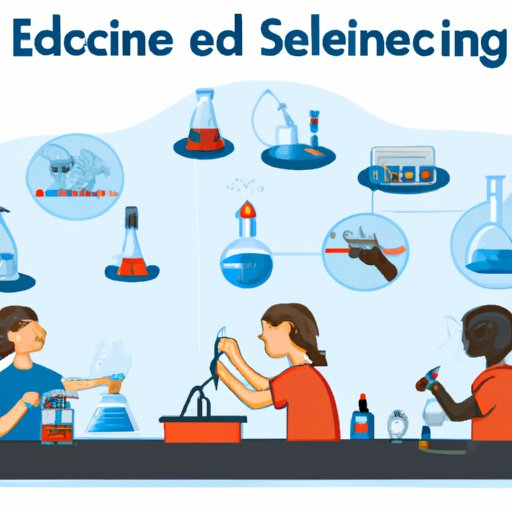Introduction
Science education refers to the teaching and learning of science-related topics. It is an important part of a student’s overall education and is designed to help them develop an understanding of the natural world, as well as the ability to think critically and solve problems. Science education has numerous benefits for both students and society, including better comprehension of scientific concepts, improved problem-solving skills, and the development of ethical values.

Exploring Common Components of Science Education
Science education involves exploring a variety of science concepts, such as biology, chemistry, and physics. Students learn about the structure and behavior of living things, the composition of matter, and the principles of energy and motion. They also acquire a basic understanding of the scientific method, which includes asking questions, forming hypotheses, designing experiments, collecting data, analyzing results, and drawing conclusions.
In addition to comprehending science concepts and the scientific method, students must also engage in experimentation and problem-solving. Experimentation helps them to gain a deeper understanding of the scientific principles they are studying. Through problem-solving activities, they can practice applying their knowledge and develop critical thinking skills.
Comparing Different Approaches to Science Education
There are several approaches to teaching and learning science. Traditional classroom instruction is the most common approach and involves lectures, readings, and discussion. Hands-on experiences, such as field trips and laboratory work, provide students with opportunities to directly observe and interact with the physical world. Online learning offers students access to a wide range of digital content and activities, from videos and interactive simulations to virtual laboratories and online discussions.

Examining Challenges in Science Education
Despite the many benefits of science education, there are still numerous challenges that educators face. One of the primary obstacles is a lack of resources. Schools often struggle to obtain the materials needed for experiments, as well as the equipment required for hands-on activities. Additionally, it can be difficult to engage students in science-related topics, particularly if they have limited access to real-world examples or are not interested in the subject matter.
Social and cultural factors can also play a role in how students perceive and respond to science education. For example, some students may not feel comfortable asking questions or participating in class discussions due to cultural norms or gender stereotypes.
Conclusion
Science education is an essential part of a student’s educational experience, providing them with the knowledge and skills needed to understand the natural world and make informed decisions. It involves exploring a variety of science concepts, understanding the scientific method, engaging in experimentation and problem-solving, and utilizing different approaches to teaching and learning. While science education has numerous benefits, there are still challenges that educators must address, such as lack of resources, difficulty engaging students, and social and cultural factors.
For those interested in learning more about science education, there are numerous resources available, such as books, websites, and workshops. Additionally, teachers can create engaging and meaningful learning experiences by incorporating hands-on activities, using technology, and encouraging student collaboration.
(Note: Is this article not meeting your expectations? Do you have knowledge or insights to share? Unlock new opportunities and expand your reach by joining our authors team. Click Registration to join us and share your expertise with our readers.)
